仁爱版英语七年级(上册)各单元知识点归纳
仁爱版七年级上册英语知识点归纳
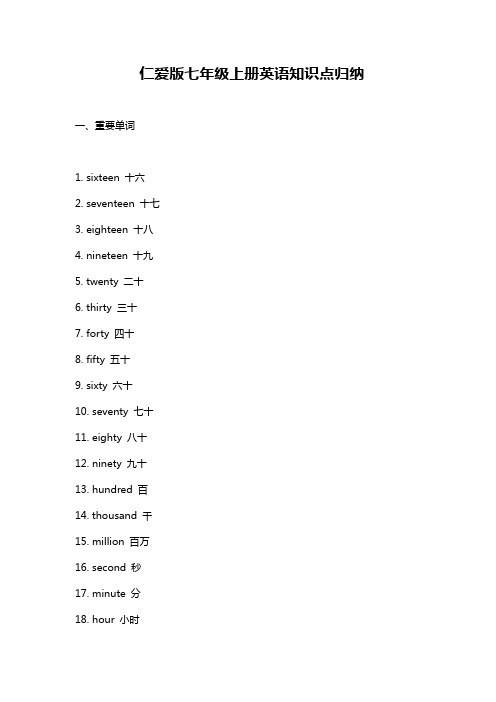
仁爱版七年级上册英语知识点归纳一、重要单词1. sixteen 十六2. seventeen 十七3. eighteen 十八4. nineteen 十九5. twenty 二十6. thirty 三十7. forty 四十8. fifty 五十9. sixty 六十10. seventy 七十11. eighty 八十12. ninety 九十13. hundred 百14. thousand 千15. million 百万16. second 秒17. minute 分18. hour 小时19. morning 早上20. afternoon 下午21. evening 晚上22. night 夜晚23. change 改变24. China 中国25. American 美国26. English 英语27. learn 学习28. Chinese 中文29. want 想要30. read 读二、重要句型1. How old are you? 你多大了?2. I'm fourteen. 我14岁。
3. What time is it? 现在几点?4. It's one o'clock . 现在1点。
5. What's your nationality? 你是什么国籍?6. I'm Chinese. 我是中国人。
7. Do you like English? 你喜欢英语吗?8. Yes, I do. / No, I don't. 是的,我喜欢。
/ 不,我不喜欢。
9. What language do you want to learn? 你想学什么语言?10. I want to learn Chinese. 我想学中文。
仁爱版英语七年级上册单元知识点
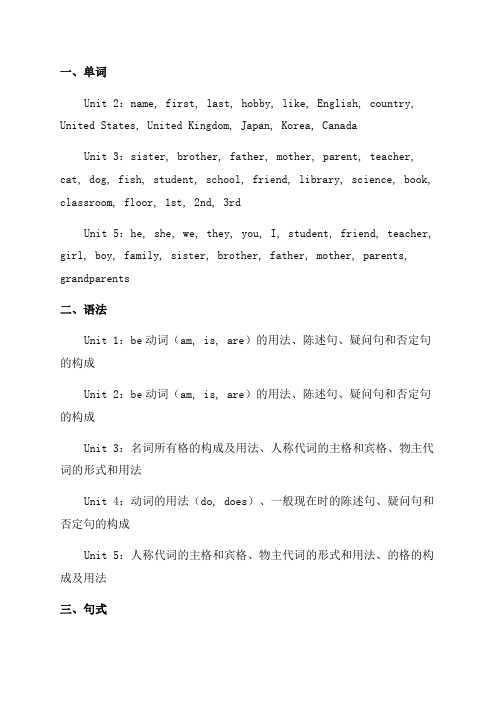
一、单词Unit 2:name, first, last, hobby, like, English, country, United States, United Kingdom, Japan, Korea, CanadaUnit 3:sister, brother, father, mother, parent, teacher, cat, dog, fish, student, school, friend, library, science, book, classroom, floor, 1st, 2nd, 3rdUnit 5:he, she, we, they, you, I, student, friend, teacher, girl, boy, family, sister, brother, father, mother, parents, grandparents二、语法Unit 1:be动词(am, is, are)的用法、陈述句、疑问句和否定句的构成Unit 2:be动词(am, is, are)的用法、陈述句、疑问句和否定句的构成Unit 3:名词所有格的构成及用法、人称代词的主格和宾格、物主代词的形式和用法Unit 4:动词的用法(do, does)、一般现在时的陈述句、疑问句和否定句的构成Unit 5:人称代词的主格和宾格、物主代词的形式和用法、的格的构成及用法三、句式Unit 1:What's your English teacher's name? / My English teacher's name is Miss Green.Unit 2:What's your hobby? / My hobby is playing soccer.Unit 3:Is this your classroom? / Yes, it is. / No, it isn't.Unit 5:Are they students? / Yes, they are. / No, theyaren't.四、重点短语Unit 1:be good at, like music, art, like Chinese bestUnit 2:What do you like? I like...Unit 3:a photo of... , look at, on the desk, in the floorUnit 4:a ruler in her hand, sit at a deskUnit 5:in my family, my mother is..., my father and I are..., with my sister and brother, my grandparents五、口语表达Unit 1:Hello! / Hi! / How are you? / I'm fine, thank you.Unit 2:What's your hobby? / My hobby is...Unit 3:What's your father's job? / He is a...以上是仁爱版英语七年级上册单元知识点的大致内容,学生在学习过程中应熟练掌握这些知识点,以便能够正确理解课文内容,并在口语、阅读、写作等方面能够灵活运用。
仁爱版七年级英语上册知识汇总(最新版)
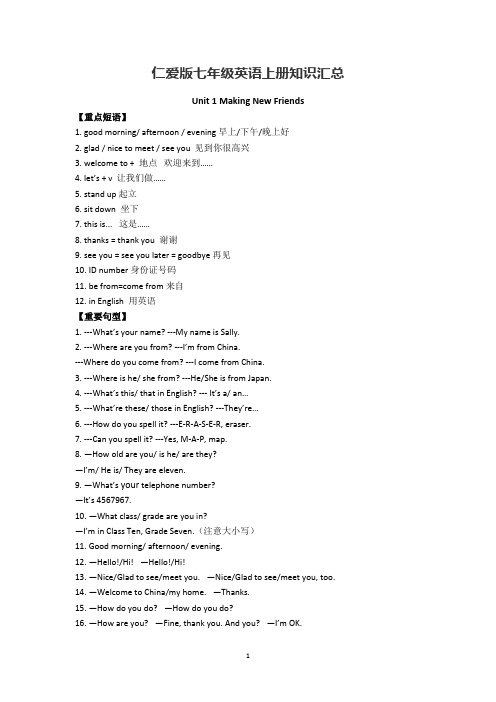
仁爱版七年级英语上册知识汇总Unit 1 Making New Friends【重点短语】1. good morning/ afternoon / evening 早上/下午/晚上好2. glad / nice to meet / see you 见到你很高兴3. welcome to + 地点欢迎来到……4. let’s + v让我们做……5. stand up 起立6. sit down 坐下7. this is... 这是……8. thanks = thank you 谢谢9. see you = see you later = goodbye 再见10. ID number 身份证号码11. be from=come from 来自12. in English 用英语【重要句型】1. ---What’s your name? ---My name is Sally.2. ---Where are you from? ---I’m from China.---Where do you come from? ---I come from China.3. ---Where is he/ she from? ---He/She is from Japan.4. ---What’s this/ that in English? --- It’s a/ an…5. ---What’re these/ those in English? ---They’re…6. ---How do you spell it? ---E-R-A-S-E-R, eraser.7. ---Can you spell it? ---Yes, M-A-P, map.8. —How old are you/ is he/ are they?—I’m/ He is/ They are eleven.9. —What’s your telephone number?—It’s 4567967.10. —What class/ grade are you in?—I’m in Class Ten, Grade Seven.(注意大小写)11. Good morning/ afternoon/ evening.12. —Hello!/Hi! —Hello!/Hi!13. —Nice/Glad to see/meet you. —Nice/Glad to see/meet you, too.14. —Welcome to China/my home. —Thanks.15. —How do you do? —How do you do?16. —How are you? —Fine, thank you. And you? —I’m OK.17. —See you then/ later. —See you.18. —Goodbye. —Bye.19. —Thank you. —You’re welcome./That’s OK./Not at all.【重点语法】1. 元音字母:Aa Ee Ii Oo Uu包含有以下元音的字母:[e] Aa Hh Jj Kk[i:] Ee Bb Cc Dd Gg Pp Tt Vv[aɪ] Ii Yy[ju:] Uu Qq Ww[e] Ff Ll Mm Nn Ss Xx Zz2. 大小写句首字母,人名,地名,称呼语,专有名词,星期的首字母要大写,引人注意。
仁爱版七年级上册英语全册知识点总结

考点一 thank的用法 【课文原句】 Thank you. 谢谢你。(七上P1) thank常用在日常交际中,表示对对方的感激之情。其常用 句型为thank sb. for (doing) sth.“因(做)某事而感谢某人”, 相当于“thanks for (doing) sth.”。
单项选择 4.(2019·预测)—Hello, this is Tina speaking. Is that Sam? —Sorry, he isn't here at this moment. _A__? A.Can I take a message B.What are you saying to Tina C.May I speak to Sam D.What's that speaking
【拓展】
词汇 helpful helpless
含义
用法
有帮助的;有用的
be helpful to...“对……有用 ”
feel helpless“感到无能为力 无助的;无法抑制的
”
用适当的介词填空 13.Bill has made great progress _w__it_h_ the help of his teacher.
单项选择
7.(2018·安徽中考)—Will you go to the picnic this Saturday?
—I'd like to, _A__ I'll have to help look after my baby sister.
A.but
B.or
C.and
D.so
8.(2018·湖北襄阳中考)—Be quick, _C__ we'll fail to catch
仁爱英语七年级上册知识点归纳完整版
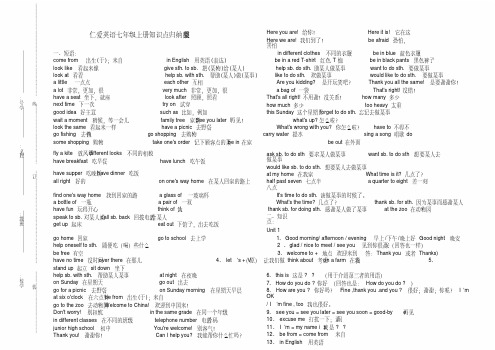
仁爱英语七年级上册知识点归纳完整版Here you are! 给你!Here it is! 它在这Here we are! 我们到了!be afraid 恐怕,害怕一、短语:in different clothes 不同的衣服be in blue 蓝色衣服come from 出生(于);来自in English 用英语(表达) be in a red T-shirt 红色 T 恤be in black pants 黑色裤子look like 看起来像give sth. to sb. 把(某物)给(某人) help sb. do sth.助某人做某事want to do sth. 要做某事look at 看着help sb. with sth. 帮助(某人)做(某事) like to do sth. 欢做某事would like to do sth. 要做某事a little 一点点each other 互相Are you kidding? 是开玩笑吧?Thank you all the same! 是要谢谢你!a lot 非常,更加,很very much 非常,更加,很 a bag of一袋That's right!没错!:号学线have a seat坐下,就座look after 照顾,照看next time 下一次try on 试穿good idea 好主意such as 比如,例如That's all right!不用谢!没关系!how many多少how much多少too heavy太重this Sunday这个星期日forget to do sth.忘记去做某事wait a moment 稍候,等一会儿family tree 家谱S ee you later再!见!what's up?怎么啦?look the same 看起来一样have a picnic 去野餐What's wrong with you?你怎么啦?have to不得不go fishing 去钓鱼go shopping 去购物carry water提水sing a song唱歌 do some shopping购物take one's order记下顾客点的菜be in 在家be out在外面:名姓fly a kite 放风筝different looks 不同的相貌have breakfast吃早餐have lunch 吃午饭ask sb. to do sth要. 求某人做某事want sb. to do sth想.要某人去做某事would like sb. to do sth.想要某人去做某事订have supper吃晚饭have dinner 吃饭all right 好的on one's way home 在某人回家的路上at my home在我家What time is it?几点了?half past seven七点半 a quarter to eight差一刻八点find one's way home 找到回家的路 a glass of 一玻璃杯It's time to do sth.该做某事的时候了。
仁爱英语七年级上册知识点归纳
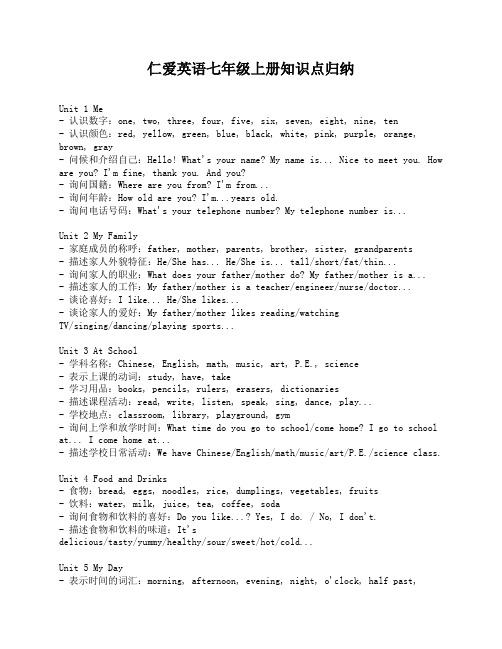
仁爱英语七年级上册知识点归纳Unit 1 Me- 认识数字:one, two, three, four, five, six, seven, eight, nine, ten- 认识颜色:red, yellow, green, blue, black, white, pink, purple, orange, brown, gray- 问候和介绍自己:Hello! What's your name? My name is... Nice to meet you. How are you? I'm fine, thank you. And you?- 询问国籍:Where are you from? I'm from...- 询问年龄:How old are you? I'm...years old.- 询问电话号码:What's your telephone number? My telephone number is...Unit 2 My Family- 家庭成员的称呼:father, mother, parents, brother, sister, grandparents- 描述家人外貌特征:He/She has... He/She is... tall/short/fat/thin...- 询问家人的职业:What does your father/mother do? My father/mother is a...- 描述家人的工作:My father/mother is a teacher/engineer/nurse/doctor...- 谈论喜好:I like... He/She likes...- 谈论家人的爱好:My father/mother likes reading/watchingTV/singing/dancing/playing sports...Unit 3 At School- 学科名称:Chinese, English, math, music, art, P.E., science- 表示上课的动词:study, have, take- 学习用品:books, pencils, rulers, erasers, dictionaries- 描述课程活动:read, write, listen, speak, sing, dance, play...- 学校地点:classroom, library, playground, gym- 询问上学和放学时间:What time do you go to school/come home? I go to school at... I come home at...- 描述学校日常活动:We have Chinese/English/math/music/art/P.E./science class.Unit 4 Food and Drinks- 食物:bread, eggs, noodles, rice, dumplings, vegetables, fruits- 饮料:water, milk, juice, tea, coffee, soda- 询问食物和饮料的喜好:Do you like...? Yes, I do. / No, I don't.- 描述食物和饮料的味道:It'sdelicious/tasty/yummy/healthy/sour/sweet/hot/cold...Unit 5 My Day- 表示时间的词汇:morning, afternoon, evening, night, o'clock, half past,quarter past, quarter to- 描述一天的安排:I get up at... I go to school at... I have lunch at (I)come home at... I do my homework at... I go to bed at...- 谈论每天做的事情:I usually... I sometimes... I often... I always... on weekdays/on weekends.- 描述一周的安排:Monday, Tuesday, Wednesday, Thursday, Friday, Saturday, Sunday. On Monday, I have Chinese/English/math/music/art/P.E./science class.Unit 6 In the Classroom- 描述教室物品:desk, chair, blackboard, bookcase, door, window, computer, clock- 表示教室位置:in front of, behind, next to, on, under, in, between- 询问教室物品的位置:Where is the...? It's... In/on/under/next to/between... - 描述教室活动:sit, stand, open, close, read, write, listen, speak, draw, sing, dance, play...- 询问和回答问题:What's this? It's a/an... What are these? They're...- 数词:first, second, third, fourth, fifth, sixth, seventh, eighth, ninth, tenthUnit 7 Sports and Hobbies- 描述体育运动:play basketball/football/tennis/volleyball/baseball/table tennis/badminton/swimming...- 描述爱好:My hobby is... I like... I enjoy...- 提问对方的爱好:What's your hobby? Do you like...? Yes, I do. / No, I don't. - 数词:every day, once a week, twice a month, three times a year- 谈论周末的活动:On weekends, I often... I sometimes... I never...以上是仁爱英语七年级上册的知识点归纳,希望对您有所帮助。
仁爱版英语七年级上册单元知识点
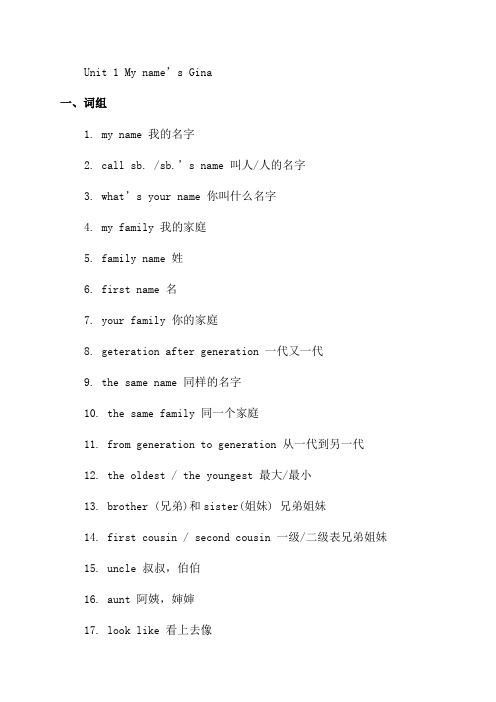
Unit 1 My name’s Gina一、词组1. my name 我的名字2. call sb. /sb.’s name 叫人/人的名字3. what’s your name 你叫什么名字4. my family 我的家庭5. family name 姓6. first name 名7. your family 你的家庭8. geteration after generation 一代又一代9. the same name 同样的名字10. the same family 同一个家庭11. from generation to generation 从一代到另一代12. the oldest / the youngest 最大/最小13. brother (兄弟)和sister(姐妹) 兄弟姐妹14. first cousin / second cousin 一级/二级表兄弟姐妹15. uncle 叔叔,伯伯16. aunt 阿姨,婶婶17. look like 看上去像18. so do I 我也是二、重点句型1. What's your name? 你叫什么名字?2. My name's Gina. 我的名字叫吉娜。
3. What's your family name? 你的姓是什么?4. Our family name is Green. 我们的姓氏是格林。
5. Tom's my first cousin. 汤姆是我的一级表兄弟。
6. We have the same family name. 我们有同样的姓氏。
7. Does he look like you? 他和你长得像吗?8. Yes, he does. 是的,他和我很像。
10. We have the same family name. 我们有同样的姓氏。
三、语法1.否定句式:简单的反意疑问句式特别提醒:此句式要紧跟句首的动词(be动词)的原形,而do/does 动词变为相应的don't/doesn't形式,句末须加上简短的句尾,如:No, it isn't./ No, he doesn't.2.动词的三单形式:在英式英语中,be动词的三单形式有三种:am、is、are(我、你、他、它、这、那等用is;我们、你们、他们、它们、这些、那些等用are)。
仁爱版七年级上册语法知识点总结

仁爱版七年级上册语法知识点总结一、一般现在时。
1. 概念。
- 表示经常发生的动作或存在的状态。
例如:I often get up at six o'clock.(我经常在六点起床。
)- 表示客观事实或普遍真理。
例如:The earth goes around the sun.(地球绕着太阳转。
)2. 句子结构。
- 肯定句:- 主语 + be动词(am/is/are)+ 其他。
例如:He is a student.(他是一名学生。
)- 主语(非第三人称单数)+ 动词原形+ 其他。
例如:They play football every day.(他们每天踢足球。
)- 主语(第三人称单数)+ 动词第三人称单数形式+ 其他。
例如:She likes reading books.(她喜欢读书。
)- 否定句:- 主语 + be动词(am/is/are)+ not+ 其他。
例如:I am not a teacher.(我不是一名教师。
)- 主语(非第三人称单数)+ don't+ 动词原形+ 其他。
例如:They don't like apples.(他们不喜欢苹果。
)- 主语(第三人称单数)+ doesn't+ 动词原形+ 其他。
例如:He doesn't go to school on Sunday.(他星期天不去上学。
)- 一般疑问句:- Be动词(am/is/are)+ 主语 + 其他?例如:Are you a doctor?(你是一名医生吗?)- (非第三人称单数)Do+ 主语+ 动词原形+ 其他?例如:Do they play basketball?(他们打篮球吗?)- (第三人称单数)Does+ 主语+ 动词原形+ 其他?例如:Does she have a pen?(她有一支笔吗?)二、名词的单复数。
1. 规则变化。
- 一般情况加 -s。
例如:book - books,pen - pens。
- 1、下载文档前请自行甄别文档内容的完整性,平台不提供额外的编辑、内容补充、找答案等附加服务。
- 2、"仅部分预览"的文档,不可在线预览部分如存在完整性等问题,可反馈申请退款(可完整预览的文档不适用该条件!)。
- 3、如文档侵犯您的权益,请联系客服反馈,我们会尽快为您处理(人工客服工作时间:9:00-18:30)。
惠安县仁爱英语七年级上册知识点归纳作者:骆鸿勇Unit 11、 Good morning/ afternoon / evening 早上/下午/晚上好Good night 晚安(晚上告别)2、glad / nice to meet / see you 见到你很高兴(回答也一样)3、welcome to + 地点欢迎来到…… (回答:Thank you 或者Thanks)4、 let’s + V(原)让我们做……5、stand up 起立 sit down 坐下6、this is----- 这是……(用于介绍第三者的用语)7、How do you do ?你好(回答也是:How do you do ? )8、How are you ? 你好吗?Fine ,thank you .and you ? 很好;谢谢;你呢?I’m OK / I’m fine , too . 我也很好。
9、see you = see you later = see you soon = good-bye 再见10、excuse me 打扰一下;请问11、I’m -----= my name is ---- 我是……12、be from = come from 来自13、in English 用英语14、 Can you spell it ? Yes / No 你能拼写它吗?能/不能15、That’s OK / That’s all right / You’re welcome / Not at all 不用谢16、…… years old ……岁17、telephone number 电话号码 QQ number QQ号码 ID number 身份证18、 the same (相同的)反义词是 different (不同的)例: We are in the same grade, but we are in different classes.句型:1. What is your name ? 你的名字是什么?2. Where +be + 主语 + from? 某人来自于哪里?(回答:主语+be+地点)Where are you from? I am from quanzhou.3. How old + be + 主语?某人几岁? (回答:主语 + be + 数字 )例: How old are you ? I’m forteen.4. What is your telephone number? 你的电话号码是多少?(回答:My telephone number is----或者It’s -------)注意:读出号码的时候要逐个读出。
5. What class / grade +be + 主语 + in ? 某人在哪一个班级/年级?例:what class are you in ? I am in Class Five.(注意:Class 和 Five需要大写)what grade are you in ? I am in Grade Seven.(注意:Glass 和 Seven需要大写)6. What’s this/ that (in English) ? 这是什么?(回答:I t’s a/an + 单数名词. 这是……)What’ re these/ those (in English) ? 这些是什么?(回答:They’re + 复数名词这些是……)7. How do you spell it ? 你怎么拼写它?E-R-A-S-E-R, eraser. (注意拼读方法)Unit 21、 sb + has/ have ( an /a ) + adj + 五官=== sb’s 五官is / are + adj (描述长相)例:Lily has a small nose. = Lily’s nose is small.2、I know = I see 我明白了3、That’s right 那是对的4、look the same look like 看起来相像 look different 看起来不同例: Jim and Lilei look the same.== Jim looks like Lilei. .5、look at + n 看某物 look for +n 寻找某人/某物 look after +n 照顾某人6、 both 两者都…… all 三者或者三者以上都……Both 和 all位于 be动词或情态动词后,位于行为动词前。
例: We are both students. We both have black eyes. We can both speak English.7、give sth to sb = give sb sth 把某物给某人; (注意:如果sth是it或them,只能用前者)8、have different looks == look different 有着不同的长相(看起来不相像)have the same look. ==look the same 有着相同的长相 (看起来很相像)9、over there 在那边 come in 请进 go out 出去10、in + 颜色或 in a/an/the +颜色 + 衣服表示穿着……颜色的衣服常常接在名词的后面,表示穿----颜色衣服的……如the girl in red is my sister.11、too + adj 太……12、 pants 和 shoes 做主语,谓语动词用复数;但a pair of pants/ shoes作主语时,谓语动词用单数形式例: His shoes are black. A pair of shoes is under the bed.13、in the morning/ afternoom/ evening 在早上/下午/晚上 at night在晚上14、go shopping = go to the shop 去购物类似的有 go swimming go fishing go skating 等等15、help sb. ( to ) do sth == help sb with sth 帮助某人做某事注意:sb 用代词时必须用宾格16、 high school 中学17、play +球类 play the 乐器18、 think of 认为,想 think about 考虑 I think + 从句我认为……I think he you are right. 否定式常否定主句,但翻译时要否定后面的从句例:I don’t think he can come. 我认为他不会来了.(不能说:我不认为他会来)句型:1、What do/does + 主语 + look like ? 询问人的长相例: What does your English teacher look like ?2、 What’s -----and ------? ……加……是什么?(回答:It’s ------)例:What’s red and yellow? It’s orange. What’s two and five? It’s seven.3、 Whose + 东西 + is this/ that ? Whose + 东西 +are these/ those ? 这/这些是谁的……?例:Whose coat is this ? It is mine. Whose shoes are these ? They are hers.4、 Who is the letter from? 这封信来自于谁? It’s from Lily. 它来自于莉莉。
5、 What color be + 东西? (回答:It’s +颜色或者 They’er +颜色)例:What color is your dress? It’s black.Unit 31、Could you (please)……(后接动词原形)你愿意做某事吗?May I ……(后接动词原形)我能做某事吗?2、 the English corner 英语角3、 live in + 地点住在某地 live with + 人和某人住在一起4、 What does he say in the letter? 他在信里说了些什么?What does he say on the photo? 他在电话里说了些什么?5、 a lot = very much 放在句末,修饰动词,非常……例: I like the boy a lot/ very much.not at all 一点也不……例: I don’t like the boy at all..6、 each other 相互,彼此 students often talk to each other in class.7、do sth with sb 和某人一起做某事8、No problem 没问题9、speak + 语言说某种语言 speak English speak Chinese10、 the Great Wall 长城11、come/go to + 地点去某地但home 、here 、 there 这些是副词,前面不能加to例:go home / come here / go therego to do sth 去做某事例:They go to play basketball.12、like doing sth 喜欢做某事 like to do sth 想要做某事13、It’s + adj +to sb 对某人来说是……的14、 help sb with sth =help sb (to) do sth 帮助某人某事15、 be at home = be in 在家 go home 回家 get home到家 in one’s home 在某人的家里16、have a seat / take a seat / sit down 请坐下17、office worker 办公室职员 cook 厨师 cooker炊具18、on a farm 在农场上on the sofa 在沙发上19、 a photo of one’s family 某人的全家照Family Tree 家谱 (首字母都大写)20、 in a hospital 在医院(纯属地点概念) in hospital 因病住院例:He is ill in hospital. 他生病住院 He is in a hospital.他在医院里 (不一定是因为生病来到医院)21、look after sb = take care of sb 照顾某人22/ teach sb sth = teach sth to sb 教某人某东西 teach sb to do sth 教某人做某事21、help oneself ( to sth. ) 请随便(吃……)help yourself/ yourselves (to fish)22、I’d like sth = I would like sth. 我想要……24、 Would like to do sth = want to do sth 想要做某事25、 Would you like something to eat (drink)? 你想要一些吃(喝)的东西吗?to eat 或 to drink 修饰something,作为后置定语。
